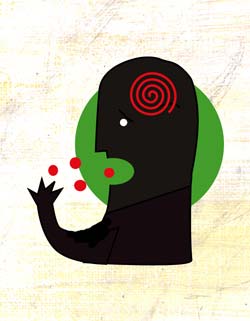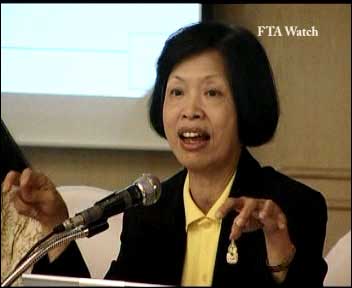Bangkok Post | 29/04/2009
An ’unacceptable’ free trade agreement
By: JIRAPORN LIMPANANONT

Desperate times call for desperate measures. Multinational pharmaceutical companies are facing unprecedented pressure to change the way they do business.
The patents on many of the medicines that make big profits are about to expire; and new, innovative medicines are not being developed. As patents expire, multinational firms face fierce competition from low-cost producers that manufacture affordable, generic medicines for use across the developing world.
So it is hardly surprising that the pharmaceutical industry and the European Union are using the opportunity of a new free trade agreement between the EU and the Association of Southeast Asian Nations to force developing countries to extend 20-year monopoly patent rights for medicines.
In 2001, the World Trade Organisation and all participating countries, including the countries of the European Union, agreed to the Doha Declaration on Trade Related Aspects of Intellectual Property Rights (TRIPS) and Public Health.
The Doha Declaration reaffirms that intellectual property rules for medicines should not interfere with the right of countries to use safeguards to promote and protect public health.
Yet the free trade agreement the EU has proposed to Asean deliberately undermines the Doha Declaration — by imposing new intellectual property protections known collectively as TRIPS-Plus Rules.
The first thing the proposed EU-Asean FTA does is to find a way to extend 20-year exclusive patents on medicines. It does this by allowing companies to seek extensions on the length of a patent if there are any delays in getting approval to advertise and market the medicine. This extension can be up to 15 years — almost the same amount of time as the initial patent term.
In reality, drug authorities in countries like Thailand need time to study medicines to ensure they are safe, effective and will protect public health.
It is a deliberate and careful process.
By penalising countries for thoroughly checking the effectiveness of medicines, the EU is forcing poor Southeast Asian people to pay for unaffordable medicines for up to 15 more years. For a Thai person living with HIV, cancer or heart disease, this could be the difference between life and death.
The proposed FTA would also introduce "data exclusivity" in Thailand, a TRIPS-Plus Rule which further extends a company’s monopoly rights over a patented or non-patented medicine. "Data exclusivity" expands a multinational pharmaceutical company’s control over clinical trial data it produces to demonstrate that an originator medicine is safe and effective.
The generic manufacturer uses the same active ingredient when it is off-patent or non-patent to produce the medicine.
Then, the bioequivalent study must be carried on in order to prove that it has the same quality as the originator drug without a need to conduct a clinical trial again.
"Data exclusivity" introduces another monopoly term of a medicine because it provides multinational pharmaceutical companies the right to ask a government to not refer to this crucial clinical trial data for a period of time to approve a generic version of a medicine.
Until this period of time expires, a generic medicine, even if it is safe and effective, cannot be introduced.
In many situations, the monopoly term created by data exclusivity continues beyond the term of patent protection, thereby extending the patent term for medicines and thus denying access to affordable medicines.
Even more worryingly, the "data exclusivity" clause prevents Asean countries from using an important safeguard — compulsory licensing — to protect public health until the data exclusivity term expires.
The Thai government has given 26,000 people living with HIV and Aids access to essential 2nd-line anti-retroviral drugs at no cost, due mostly to the country’s use of compulsory licensing.
Compulsory licensing enabled the government to import affordable generic versions of 2nd-line anti-retroviral medicines that are at least 50% cheaper than patented anti-retrovirals.

If Thailand were to sign a free trade agreement with the European Union under the proposed terms and conditions, compulsory licensing, a lifeline for thousands of poor people, would be cut off.
The EU-Asean trade agreement also proposes to introduce additional measures that would limit the trade and transportation of medicines between countries.
These measures, which would have to be enforced by the Thai government at the border, may result in legitimate, generic medicines being "seized," thereby fated to sit in customs warehouses instead of saving lives.
We have seen the consequences of border measures in recent months — the Dutch government’s recent seizure of legal, generic medicines exported from India and on their way to Brazil and Nigeria is a warning signal of how these border measures can limit trade in generic medicines.
Thailand and the other Asean regions cannot accept this free trade agreement as it stands.
It is too unbalanced, too exploitative. It almost absolutely ignores the interests of consumers, citizens’ rights, and the development, economic or budgetary imperatives of governments. It forces poor people to make the choice between life-saving medicines and food, shelter and education.
The irony is that with this free trade agreement the European Community is seeking to export to developing countries the very actions it is looking to curb in its own backyard.
Over the last 15 months, the EC has itself initiated and now expanded its own investigation of the multinational pharmaceutical industry for denying European consumers the benefits of generic medicines.
People of Asean are standing firm on the need for generic medicines - shoulder to shoulder. But in the face of stalling regional negotiations, the EU is resorting to bilateral negotiations.
This "divide-and-conquer" approach shows the European Community is willing to use desperate measures on behalf of the multinational pharmaceutical industry — whatever the cost.
Jiraporn Limpananont is a former lecturer on pharmacy at Chulalongkorn University, a member of FTA Watch and honourable member of Oxfam’s global W8 campaign - a group of eight women selected for their active advocacy work for better health and education